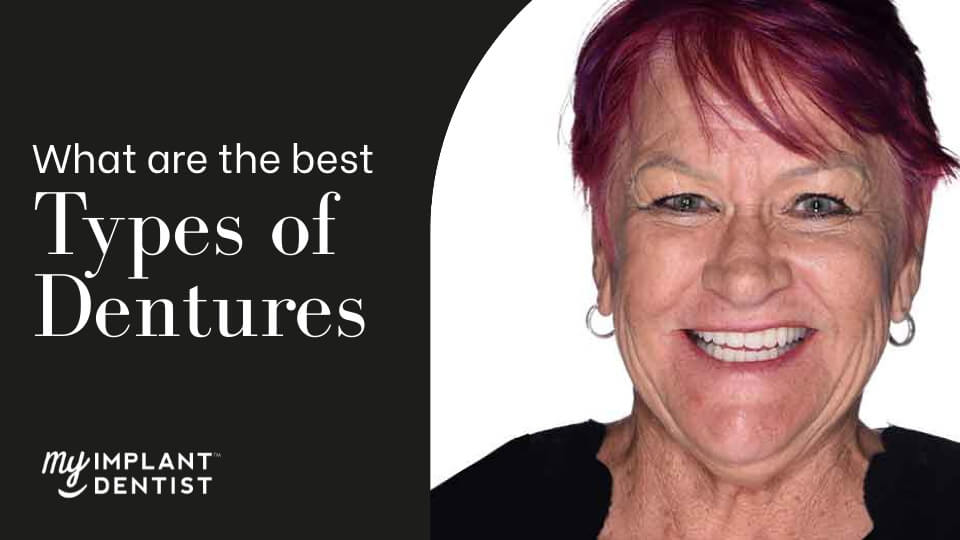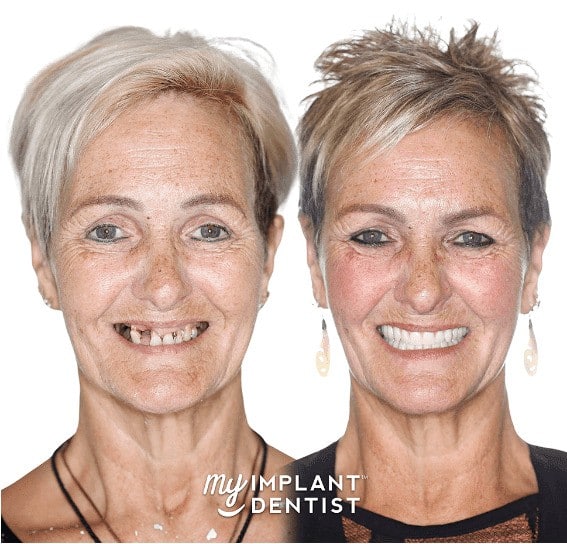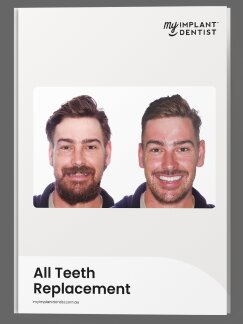
Contents
If you’re looking for the best denture options, you’ve come to the right place.
Snap-in dentures are the best in terms of stability. With the help of anchors on existing teeth or dental implants, these dentures snap into place securely. These dentures are appropriate for patients who have missing teeth but also have sufficient bone tissue to support an implant.
This article will cover the different types of dentures and how to care for them. Learning about the different types of dentures and their differences is the best way to decide on which is best for you, as they may appear similar.
We recommend that you schedule a consultation with your dentist if you are looking for the best dentures near you. Nonetheless, you should be aware of the various types of dentures.

What exactly are dentures?
Dentures (false teeth) are dental prosthetics or artificial teeth that replace missing teeth, gums, and the surrounding tissue. You may have lost one or more of your teeth due to tooth decay, gum disease, or facial injuries – dentures can be used to replace your teeth in any of these scenarios.
Over time, facial muscles can sag if teeth are missing. Dentures are tailor-made to help you improve your appearance by filling in the gaps in your facial features. They also make it more convenient to chew, eat, and speak as if you had natural teeth. Dentures are available in both removable and fixed versions.
Common types of dentures
- Complete dentures: These are ideal for patients missing all or the majority of their teeth on the upper jaw, lower jaw, or both.
- Partial removable dentures: Patients who have a few missing teeth or prefer a removable option should consider partial removable dentures.
- Partial fixed dentures: Partial fixed dentures is one of the best dentures for non-removable options for patients who are missing a few teeth.
- Implant-retained dentures: Also known as implant-supported dentures or snap-in dentures; this type of denture is great for patients who require maximum stability. Dental implants are screwed into the jawbone and act as a foundation to support the denture.
- Immediate (same-day) dentures: These are intended for patients who require tooth extraction and denture placement on the same day.
Denture Repair
If your denture is damaged in any way, we recommend that you see your Dental Prosthetist as soon as possible to have it repaired. Avoid attempting to repair it yourself because you may end up causing more damage, and your prosthetist may not be able to help you.
Some dental prosthodontists provide same-day and emergency denture repair, and may even be able to repair your dentures in under an hour. In the event of an emergency, you might need a second or spare set of dentures. Stay calm and see your Dental Prosthetist if you don’t have an emergency set.
In order to provide same-day or emergency denture repair, the Dental Prosthetist must:
- Examine your denture’s current condition
- Take your measurements for wearing
- Repair or replace the denture that has been damaged
- Brush and polish it before re-inserting it into your mouth.
Depending on the prosthetist’s level of experience, this can take anywhere from one hour to several hours to complete. The prosthetist will tell you how long it will take to fix your dentures, and if the damage repair will take more than a day, you will be notified and asked to return when they are ready. Damaged dentures are usually repaired in the dental prosthetist’s on-site laboratory. The lab usually has everything it needs to handle an emergency or same-day denture repair.
Is Eating Difficult with Dentures?
Dentures can be challenging to eat with at first. Start by slowly chewing soft foods on both sides of your mouth. Gradually, from semi-solid to solid food, it will become easier and more natural to eat foods from your previous diet. Any very hard, sticky, chewy or piercing food (such as very tough meat) should be avoided.
Do You Need Dental Adhesive for Dentures?
In general, no. Correctly fitted dentures should not need any help staying in place. If your dentures don’t fit properly, it’s best to consult your dental prosthetist, who will realign your dentures. Wearing dentures can make some individuals feel self-conscious, so you can try using adhesive to help you feel more confident, if necessary. Dentures can be cleaned with soap and water to remove adhesives, while a damp flannel could be used to remove the remnant in the month. Consult your dentist or dental prosthetist for advice on the best adhesive to use.
What is the Best Kind of Dentures?
Snap-in dentures are the best in terms of stability. With the help of anchors on existing teeth or dental implants, these dentures snap into place securely. These dentures are appropriate to replace missing teeth for patients who have sufficient bone mass to support an implant.
Is it Possible to Get Dentures that Look Like Natural Teeth?
By their very nature, cosmetic dentures resemble natural teeth. They are called cosmetics because they are designed to improve the appearance of your smile! Cosmetic dentures are also more natural-feeling than other denture options. They will fit comfortably in a person’s mouth, allowing them to chew and speak with more freedom.
Conclusion
If you are still unsure about the best dental option to choose, feel free to consult one of our cosmetic dentists at My Implant Dentist. There are various factors to consider when choosing the right dentures for your individual needs. At My Implant Dentist, we strive to give you the highest quality dental treatment so you can have the best smile and build your confidence.
Related Articles:




















